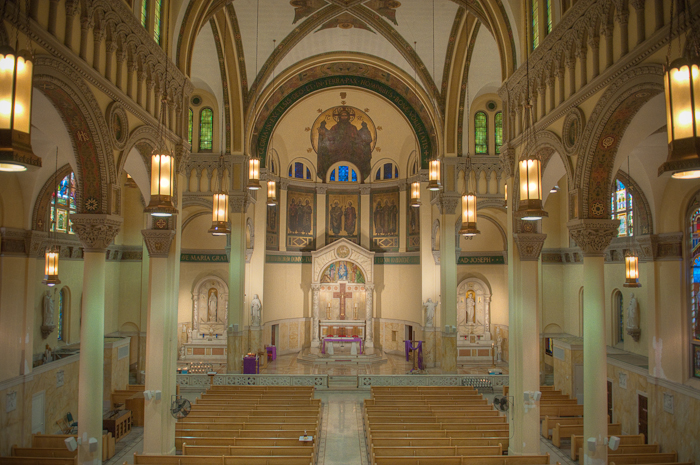Much
conversation at The New Liturgical Movement and on the
CMAA discussion boards about a book by an Episcopal priest entitled "When Sheep Attack!" (I loves me a good, snarky title.)
In broad strokes, it is about the oft-times calamitous results when an entrenched cabal in a parish insures, or tries to insure that a new leader cannot lead.
The next higher up in the chain of command through inertia, spinelessness or genuine conviction fails to support the new leader who rapidly becomes the ex-leader, and the cabal awaits the next sacrificial victim.
It happens to pastors, (bishops don't stand behind them,) it happens to music directors, (pastors don't stand behind them,) ... some details of the "It happened to me!" stories that poured out had me on the verge of joining the threads and asking who'd been reading my diary, until I learned last night of an incident that is emblematic of something far sadder.
It happens to pastors, yes and music directors.... but it happens to parochial school principles, and since the window of opportunity to affect the lives of those in their charge is much smaller, the consequences may be even worse.
Pray for Catholic educators. (And pray for those who are subjected to Catholic education?;o))
A slightly OT anecdote: When I was very young I was involved in a family situation in which I was a selfish brute and a villainess and a liar.... no, really, you could ask anyone not immediately involved in the situation and they could have told you what a little $#?% I was being.
There was nothing I could do to convince anyone otherwise.
But a few years went by and I was "rehabilitated," or at least my reputation was -- nearly everyone else in the family experienced similar episodes with the person at the center of the problem, and realized where the truth lay.
It was nice to have reassurance that I was neither a scoundrel nor a madwoman, that what I had perceived was indeed what had happened, I had not made it up, and I could stop wondering if it had been my fault or if I could have done something to change it.
Something similar has happened to a friend in a parish near me -- the person, (and that person's minions,) responsible for the firing of the most competent and consciousness musician to ever darken the doors of their loft has now managed to run off two principles in as many years, as well as the 1st music director's pretty decent successor.
The musician told me that hearing the details of the latest firing from both sides (it's a small diocese,) didn't make him happy, but at least he felt vindicated, could now understand how his fall from grace had been orchestrated, and could stop thinking that his ouster had been his fault, although he had never been able to figure out exactly how.
Is none of this giving the parish administrator a clue as where his personnel problem really lies?
Anyway, back to the comments on the book at hand:
Parishes are complex social structures. They invite everyone to join and encourage everyone to contribute time and money. But it is inevitable that pockets of interest group pressure develop within them. There are always factions. These factions can be based in ideology and theological outlook, but they are more commonly based in issues of control and perceived ownership over some sector of parish life....
There is usually one ring leader. Most often it is someone on the staff of the parish, perhaps even having retired from some ministerial position. It could be a church secretary. It could be a former youth minister. It could be the person who organizes first communions. Regardless, it is the sort of person that the whole parish regards as a fixture, someone who is seemingly indispensible to parish life.
What is the motivation for this behavior? The person and his or her follows have high “control needs.” They must be in charge if not in name then at least in reality. They are accustomed to determining structures and outcomes of parish life. They resent anyone who would interfere with their power. I know that this sounds petty and ridiculous but it is a reality....They pass on unattributed complaints....They try to recruit other people to their cause, using in particular their status as indispensable fixtures of parish life.... New pastors should not fear replacing problem staff, even to the point of cleaning house completely. The seemingly indispensable person who is the source of the problem must be sent packing as soon as possible.
- I>o
....................
I thought I was reading my autobiography -- exactly what happened in my last parish!
There is actually an epidemic of this behavior at present, so much so that in one large archdiocese there are currently seven parishes without a pastor -- because every priest has refused the assignment, for the very reasons noted in this piece.
The bishops have caused this mess by creating a Protestant parochial polity over a forty-year period. Now, the chickens are coming home to roost.
- A priest/commenter
............
On the other hand, I've witnessed new pastors who clearly lack the emotional intelligence to accomplish their goals well. It's sad to see, and it's sad to see them be so insecure as to shy away from people who try to help them, because they feel it undermines their authority.
- Another poster [wise words!]
I know that a small but vocal Neo-Cat group at a parish about 10 miles away from forced the ouster of a non-sympathetic pastor. Instead of a sympathetic pastor, though, they go a traditionalist-leaning ex-Jesuit who I am quite sure does not coddle the sometimes odd liturgical praxis favored in certain NC circles.... I think the chancery decided to have a sense of black humor about the ferocious sheep.
-- ibid
...............
have a small group of singers in the church...often cantors who want things back the way it was before you got there...having done their best to discourage new singers who were interested in the group...solved their problem, the new director, the new music, the new people, by poisoning the pastor with their take on things?
- Another musician
There is also a sad case come to our attention recently of a
MORE than competent, (and seemingly more conscientious and knowledgeable regarding Catholic praxis than many Catholic musicians,) Episcopalian MD at a Catholic parish who after years of good service was kicked to the curb for not being Catholic.
Huh?
Oh, and I feel I should take the opportunity now, because I have whined about it in the past, to say that it is
absolutely my own fault I had to offer a letter of resignation a few years ago.
I should have been savvy enough know that the power couple who didn't like me, (though that was unbeknownst to me at the time,) were too firmly ensconced in parish life and the parish power structure for anyone to fail to knuckle under to them and last, even if they should have had no say in matters that were technically my purview.
And I should not have added, even collaterally, in any way whatsoever to my priest's already over-filled plate of woes.
(Have you ever noticed, though, how people who have no respect whatever for others' years of experience or degreed expertise in a field other than their own, are often the most puffed up about their own credentials, their ten whole hours spent in diocesan training with a certificate to follow, or whatever? I digress....)
And I should have found a more felicitous way to describe the energy drain that is, all too frequently, the modern American teenager than "soul sucker." Sullen little darlings are made in the image and likeness of God, too....
One lives, one learns...
Am I going to regret writing this? I'll think about that while I pour another shandy.

















